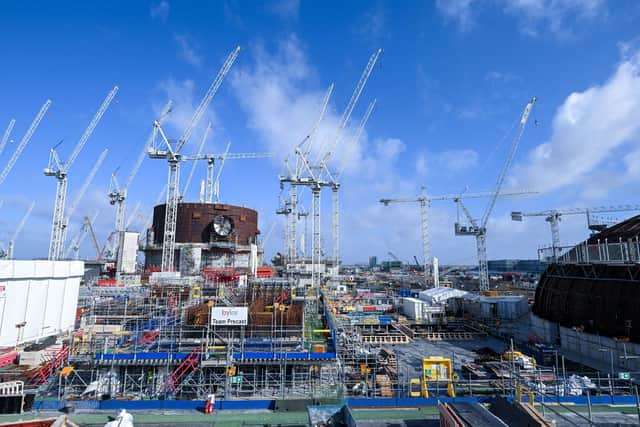Scottish and UK governments are on a collision course over nuclear energy and oil – Dr Richard Dixon
In early March, Boris Johnson said he would produce, as a matter of urgency, a plan to respond to the twin challenges of war in Ukraine and the cost-of-living crisis.
Four weeks later, we finally have the British Energy Security Strategy and it does pretty much the opposite of what’s needed. Supposedly this is because the PM and Chancellor could not agree on key measures.
Advertisement
Hide AdAdvertisement
Hide AdThe result is a strategy that convinces no-one. Even the right-wing press have roundly lambasted it.
The first thing you are taught in any class about energy is that using less is much better than producing it differently. Yet, there is nothing at all in the strategy on the quickest, cheapest and most obvious way to save energy and reduce bills – improving the energy efficiency of people’s homes.
The last thing you would do if you want to change our energy system quickly and at an affordable cost is invest in new nuclear reactors, yet that is exactly what the government plans to do, egged on by Labour’s new enthusiasm.
The cover of the strategy shows the construction site at Hinkley Point C, originally proposed in the mid-1980s, subject of a two-and-a-half year public inquiry and with construction now running ten years late and many times over budget. The world’s most expensive power plant is perhaps not the cleverest example to use.


The plan suggests eight new nuclear reactors. In 2010, the Conservative-Lib Dem coalition government planned to build eight new reactors in the next decade … 12 years later the two reactors at Hinkley are the only ones actually under construction and they might possibly producing electricity in 2027 with a price tag of £23 billion.
There will be a new round of applications for oil and gas production in the autumn, given a green gloss by the complete con that is the Climate Compatibility Checklist. The Cambo oilfield might be back on the table.
The government says it is reviewing the science on fracking, and Ineos has already kindly offered to start drilling.
The strategy does give some welcome backing to offshore wind but pressure from Tory backbenchers has meant there is only a consultation on planning for onshore wind, the quickest and cheapest way to make new green electricity.
Advertisement
Hide AdAdvertisement
Hide AdThe strategy doubles the previous commitment to producing hydrogen but perhaps half of this is to come from the sensible renewable electricity route, the rest from oil, gas and nuclear.
The Scottish Government is due to publish a set of energy scenarios before the summer and a draft Energy Strategy in the autumn. There will be plenty of energy efficiency and renewables but no new nuclear and no fracking.
When pressed by the Tories recently, the First Minister said that opening new oil and gas fields was not the answer to the current crisis. Who would have thought only a few years ago that the First Minister of Scotland would be saying no to new oil and gas?
Apart from offshore wind, the UK and Scottish plans on energy are pretty much the opposite of each other. Sparks will fly.
Dr Richard Dixon is an environmental campaigner and consultant
A message from the Editor:
Thank you for reading this article. We're more reliant on your support than ever as the shift in consumer habits brought about by coronavirus impacts our advertisers.
If you haven't already, please consider supporting our trusted, fact-checked journalism by taking out a digital subscription.
Comments
Want to join the conversation? Please or to comment on this article.
